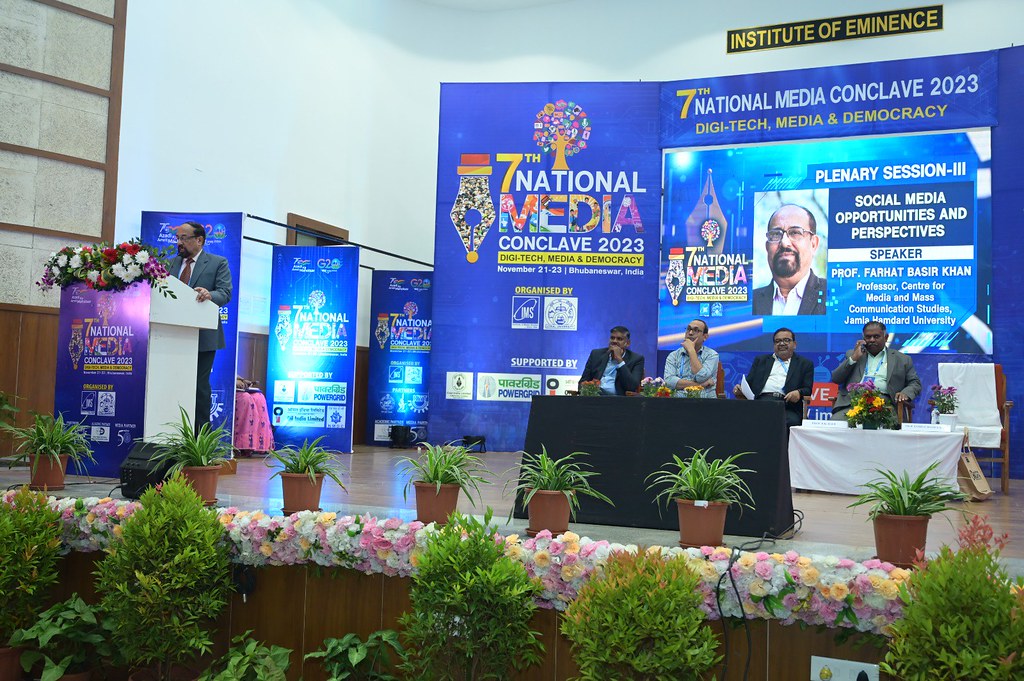Media scholars dig into social media ecosystem in education
The 7th National Media Conclave hosted by the Institute of Media Studies (IMS) in collaboration with KIIT University, Bhubaneshwar, unfolded with intellectual fervour as Professor Farhat Basir Khan, a media scholar from the Centre for Media and Mass Communication Studies, Jamia Hamdard University, emphasised leveraging digital technology for societal welfare and strengthening democracy.
Inaugurated by Governor of Chhattisgarh Biswabhusan Harichandan, Higher Education Minister of Odisha, Atanu Sabyasachi Nayak, praised the inclusive nature of Odisha’s media landscape.

Union Minister of State for Information & Broadcasting Dr L Murugan, highlighted the crucial link between media, democracy, and Digi-Tech. Information and Public Relations Minister of Odisha Pradip Kumar Amat emphasised digital technology’s transformative potential in boosting democratic participation.

Digging into social media ecosystem in education
Professor Khan’s plenary session, titled “Social Media Opportunities and Perspectives” was captivating as he navigated through the evolution of social media, elucidating its driving forces and impact on education and professional development.
In a nuanced exploration, he delved on the challenges of integrating social media into education, addressing concerns related to data, AI, and privacy. Professor Khan called for critical engagement to mould media into a robust learning platform.
Key points:
Defining Social Media: It’s not just about staying connected! Social media encompasses electronic communication forms fostering creation, consumption, and sharing across virtual communities.
Evolution Timeline: From classmates.com in 1995 to today’s multifaceted platforms, social media has transformed into a primary news source and a powerful business platform.
Driving Forces: Social media usage is fueled by the fundamental needs to belong and self-present, intensified by the design features of the platforms.
Educational Impact: Social media isn’t isolated; it intertwines with education, exposing teachers and students to new possibilities.
Educational Benefits: Social media offers collaborative learning, multicultural exposure, enhanced digital literacy, and more, benefiting both students and teachers.
Professional Development: Teachers and researchers can leverage social media for professional growth, mirroring benefits observed in healthcare professionals.
Innovative Educational Activities: The saying holds true: “It’s not what you got, but what you do with it.” Social media inspires innovative educational activities and models.
Challenges and Complexities: Adoption of social media in education is somewhat ad hoc, complex, and driven by enthusiasts, raising questions about data security, privacy, and the commercial bias.
Data and AI Concerns: The increasing value of data and AI tools poses challenges, with potential impacts on decision-making and privacy.
Call for Critical Engagement: As we weigh the benefits against challenges, critical engagement is essential. We must explore concrete measures to enhance social media as a robust learning platform.
Privacy Trade-off: Acknowledging the cost of benefits is a reduction in privacy and user control. Constant monitoring raises concerns that need attention.
Future Unknowns: The future value extracted from social media data remains uncertain. Critical thinking is crucial for civil discourse and protecting individual and institutional privacy.
Balancing Act: Despite temptations to disconnect, the value derived from social media, especially in learning and networking, highlights the need for a balanced approach.While social media offers immense potential, we must navigate challenges through open and thoughtful discussions to shape it into a powerful learning platform
Also, Professor Khan chaired a session, showcasing his deep appreciation for diverse scholarly works. Acknowledging the changing digital landscape, he highlighted the omnipresence of social media across sectors, emphasising its potential for community engagement and sustainable causes.
Professor Khan’s advocacy for the responsible use of social media underscored his commitment to harnessing its power for positive societal impact.
Founding Member of National Communication Congress Executive Committee
Professor Khan’s influence extended to the foundational aspects of the media landscape in India. As a founding member of the first National Executive Committee of the Media Congress, he contributed to shaping the vision for the future of communication and media in the country.
Alongside Professor Biplab Loho Choudhury, Chairman of the Nation Communication Congress Trust, and Professor Upendra Padhi, Secretary General of the Indian Communication Congress, Professor Khan played a pivotal role in charting the course of action during the committee meeting
Charting the Future of Media and Communication
Professor Khan’s contributions and insights at the National Media Conclave showcased his unwavering commitment to critically examining the role of social media in shaping our digital future.
His presence not only enriched the academic discourse but also propelled discussions about the establishment of the Indian Communication Congress, marking a transformative era in the media and communication discipline in India, said one participant.